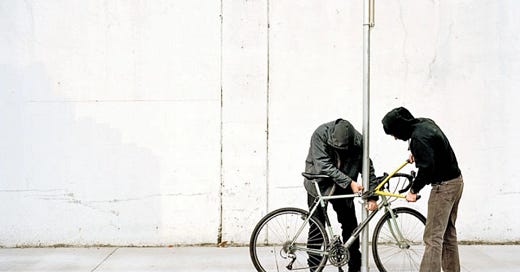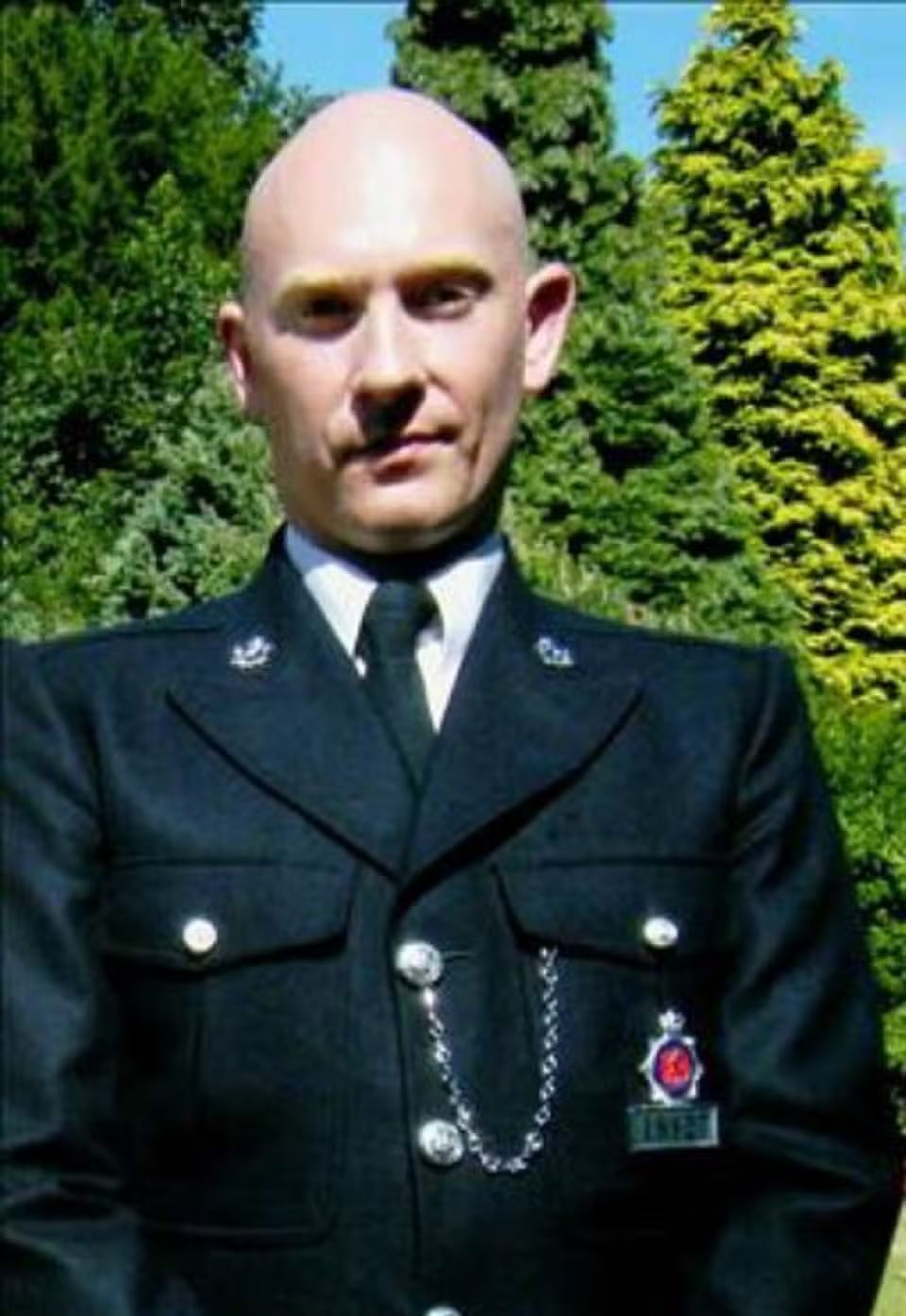Stolen bicycles, technology and anarcho-tyranny
Is police failure a prelude to societal failure?
‘Do you realise we’re symptoms of encroaching anarcho-tyranny, Darren?’
Today I’m examining the connection between volume crime, police bureaucracy and civilisational collapse. I hope you have a warm, milky beverage to hand. And a biscuit. The apocalypse is more bearable with a packet of custard creams.
First, the case of the stolen bicycle. When I saw this story, I’ll guiltily admit to a moment of ‘smug ex-cop fuzziness.’ That’s when you chuckle at police ineffectiveness or fuckwittery, reassuring yourself it wasn’t like that back in your day (etc). Except today isn’t your day (or indeed mine); when I was in uniform (the early-mid 1990s) the idea you’d be able to track a bicycle via a cheap GPS tracker was the stuff of science fiction.
The story begins with Dr. Lawrence Newport, whose bicycle was stolen from outside the CCTV-studded centre of policing excellence that is New Scotland Yard. At this point, I’m sure a few ex-Job readers are smiling, as the idea of anyone working in a police headquarters laying hands on a criminal is quite amusing. I speak, incidentally, as someone who spent a couple of years as a shiny-arse.
Anyway, Dr. Newport’s an academic who advocates locking up criminals (a refreshing change from most academics, who usually make excuses for them). Being a diligent person, he fitted an AirTag tracking device on his bike, allowing him to pinpoint its location and alert police. Despite compelling real-time evidence of a crime in action, London’s finest did, er… nothing.
This shouldn’t be a surprise to any victim of what police call ‘volume crime’ (theft, criminal damage, shoplifting and so on). Incidentally, I discussed why volume crime is important here and how the police exchanged crimefighting for ersatz social work here.
Nonetheless, If I were to indulge in the ‘back in my day’ game, it would go something like this. A bicycle would be stolen and an allegation of theft would be made. I would make local enquiries then fill in a crime sheet, asking the victim if the bike was property marked (this would be entered onto the Police National Computer Property Index, or PROPINDEX). Then, if a known scrote riding a bicycle was stopped, a constable would check said bike via his or her radio. If it was stolen, they’d arrest said scrote and restore the bicycle to its lawful owner. Or, if the victim knew where the stolen bike was, you’d phone the local police station and the CAD room would send an officer to investigate. Of course, that’s a lot of ‘ifs’ and some of them involve a patrolling police officer actually stopping people. Or having a police station you could ring. Neither of which really happens these days. The police, after all, are perennially skint.
Ironically, technology (such as the AirTag allowing Dr. Newport to report his bike’s location) is partly to blame. Technology increases knowledge, which increases reporting, which exponentially multiplies demand. Then, to manage such demand, the police implement performance management tools – yes, using more technology – to determine priorities and assign resources (locally-based humans can’t do this for some reason). Add to this a cat’s cradle of data compliance, police procedure, crime reporting rules, best practice, safeguarding, health and safety, human rights, legal tomfoolery and a plethora of handwringing reasons involving words like ‘community’ and ‘consultation’ and you’ve got a perfect storm of bullshit, one where nothing ever gets done.
The people in charge are fully aware of how policing resembles the dystopian movie Brazil. They really are. They simply haven’t a bloody clue how to fix it, or tackle the impenetrable layers of vested interests involved.
Any stuff that does get actioned is, too often, bullshit. Low-hanging fruit gets picked. The ambitious avoid areas of policing doomed to failure (i.e. investigating crime or stopping and searching people). The police are diverted into safeguarding, reassurance, vibes and low-level Stasi cosplay. This would all be the stuff of satire if it wasn’t so serious.
Why?
Because, while the police are failing to police, busy as they are responding to the social media-led tower-of-babel (or reacting to never-ending criticism), criminals take advantage. They aren’t stupid. They know the police are too busy dealing with nonsense to do the hard yards of dealing with them. They’ve got TikTok and phone cameras and the IOPC on their side too, right?
And, in the end, once the tower of babel drowns out all reason and the police are treated as an irrelevance, you’re left with what?
The future for low-trust anarcho-tyrannies? The proliferation of right-wing militias like the American ‘Boogaloo Boys’.
Well, some on the Trumpian side of the culture war suggest this is the road to anarcho-tyranny. I’ll admit, the name conjures images of ‘Mad Max’ style mayhem. Yet, like many ideas originating on the fringes, the concept is becoming mainstream. Is it because this seemingly overdramatic term contains a grain of truth? A state of anarcho-tyranny is said to occur when a government fails to protect its citizens from violence, while simultaneously persecuting conduct that would typically be regarded as innocent.
This includes enforcing the law for some crimes, while avoiding others for reasons of political expediency. That’s ‘two-tier policing’, right? Or, at the other end of the scale, is this merely an eternal grumble? Like when I used to stop motorists for traffic offences. While you’re writing a ticket, he says, ‘haven’t you got anything better to do? Shouldn’t you be catching robbers and burglars?’
The difference between now and then was, I think, (a) I couldn’t see any robberies or burglaries and (b) if I did, I’d forget the ticket and deal with the more important crime. Now? I think most coppers have a sense of proportion, but too many are indoctrinated into a process-driven world of blame, arse-covering and zero discretion. People expect the police to be firm but fair. To use commonsense (generally speaking, if I wrote a ticket it was because the recipient bloody well deserved it). Not to be robots. I wrote about technology-driven policing here, by the way.
The anarcho-tyranny soothsayers’ argument is hardly diminished by the kind of offences modern-day policing increasingly involves itself with. They’d have been laughable (if not downright sinister) in the 1990s. I wrote about Allison Pearson, free speech and race hate offences last week. Incidentally, I got shout-outs in The Spectator and The Daily Telegraph (cheers).
Another tick in the civilisational collapse column is how the police are losing the support of what we used to call ‘taxpayers’, i.e. largely law-abiding and onside members of the public. Much of this is due to the circular firing squad that is police management, but again systems and processes are to blame too. Reporting a crime, thanks to technology, has become an online obstacle course.
Add to this recruitment issues, linked to pay, conditions and the Job’s rock-bottom reputation. I recently asked a young police officer how many of their colleagues shouldn’t be in the Job. Without blinking, he replied ‘fifty percent’.
Sobering, isn’t it?
Again, in my day? Maybe five percent were of questionable quality, and that was still too much (let me know if I’m wearing rose-tinted spectacles). I strongly suspect a Wayne Couzens character would have been squared away, one way or another. Or he’d never have got through training or his probation.
Wayne Couzens, originally a special constable in Kent Police and a full-time officer in the Atomic Energy Constabulary. Then he joined the Met. A kidnapper, rapist and murderer. Was he a product of austerity-driven recruitment crisis?
What, then, is the answer? Where do you start?
I say it repeatedly, but only because its true; we live in an atomised, Balkanised society. The problems are systemic. They involve politics and economics. They involve the general public taking some horrible-tasting medicine about the cost of policing (much as they need to about the NHS, or this government does about running an economy).
It almost certainly involves sacking legions of functionaries, Blob-dwellers of power and influence (read my take on the Police Blob here). It would also require police leaders to completely rethink their approach to policing, including being prepared to take on the courts when necessary. Elon Musk would have a field day.
In short, sadly, things have to get worse before they get better.
But, in the meantime, do you know what I think the average chief constable should consider?
Why it’s so bloody easy to steal a bike from outside their HQ. Then, when the victim tells you where it is, you can’t bloody well recover it.
Get a grip.
Some other stuff.
My crime novel, after a few time-stealing false starts (I always have them) is taking shape. It’s a police corruption thriller, but from a perspective I haven’t seen covered before. This is my first novel purely concerning policing, so it’ll be interesting to see how it’s received when I punt it around publishers. Sometimes being close to a subject is a hindrance for a writer - I’ve spent a great deal of time trying to ditch my ex-policeman’s obsession with getting everything procedurally correct. I’m finally, I suppose, signing my artistic licence.
My article on Allison Pearson, as I mentioned, prompted a couple of mentions in the mainstream media. I’m pleased to report the journalists I dealt with were upfront and decent. Let it not be said I’m not fulsome in praise when it’s deserved.
Have a good week as we enter December. And if anyone has the faintest idea where November went, can they report it missing? Or put an AirTag on it, at least.
Best,
Dom







A politically incorrect attempt at humour. I am not the author. Stop reading if this offends you.
And it came to pass that the Philistines took to the streets and smashed the graven images. And the police said to their leaders, “Let Us Go Amongst Them and Give Them the Jail.” But the leaders said “No, Rock Not the Boat.”
And the word went out to bring back the retired officers of long ago who gave not a fuck about the police leaders.
The word went out to search high and low among the pubs and the bowling clubs, to leave their Tesco shopping trolleys and get back into uniform from whence they had come, for the young police said unto them, “We Have Listened to Your Shite About What You Would Have Done 30 Years Ago, Now Put Up or Shut Up.”
And they gathered together, the sick, old & lame, the sore of back and the gammy of leg, and went to sort out the Philistines.
And the Philistines laughed when saw their white hair, crying out “Fuck Off You Old Bastards”.
And the old bastards drew their sticks and delivered the Philistines a proper series of good old fashioned hidings which made them run like fuck, and there was a great wailing and gnashing of teeth in the land of the Philistines for most of them got the jail and were seen not again.
And the young police said among themselves, “These Old Guys Are Truly The Dogs Balls” and they too gave the Philistines a severe doing.
And the old police went back to their bowling clubs, armed with more good stories to bore the arse off everyone, and all lived happily ever after.
Except the Philistines of course.
There is a phrase that springs to mind….
‘People sleep peacefully in their beds at night only because rough men stand ready to do violence on their behalf’.
I’m not advocating police violence but firm, fair enforcement of the law without fear or favour should be the focus of police officers.
The increased politicisation of the police has resulted in a service that’s lost its way. You articulate it with humour and very eloquently.
A good read, thank you! Tim